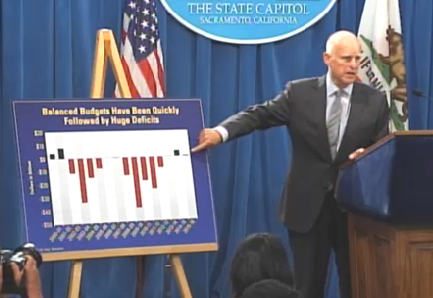
Governor Jerry Brown's “May revise” of his January budget plan, released yesterday, did not include any increases in funding for the Active Transportation Program (ATP), the main source of funds for building bicycling and pedestrian infrastructure in California.
A broad coalition of over 120 advocacy organizations recently called for increasing funding for the ATP by $100 million, but under Brown's budget the current spending plan for the ATP remains unchanged.
The budget update showed higher-than-expected revenues from tax collections and twice the money coming from the state's cap-and-trade system compared to what was anticipated in January. The cap-and-trade funds, of which $2.2 billion are allocated in the budget revision, are supposed to be spent on projects that reduce greenhouse gas emissions.
The ATP still hasn't shown up on the governor's radar, despite his recent executive order calling for more aggressive action on climate change. Brown's fiscal conservatism isn't the problem. His presentation yesterday made clear that California's deficits in recent decades have been much larger than its current surplus, thus bolstering his argument that spending down this new revenue isn't a wise move.
But the amount of money currently available in the Active Transportation Program--$120 million--is minuscule compared to the overall cap-and-trade program. And the relatively small projects and programs that compete for ATP funds are likely to produce more GHG emission reductions per dollar spent than larger projects,
The cap-and-trade money is set to be divided along the following lines:
- 25 percent to high speed rail ($550 million in current budget)
- 20 percent to affordable housing ($440 million)
- 5 percent to low-Carbon transit operations ($1 million)
- 10 percent to transit and intercity rail capital ($2 million)
- 40 percent open ended—to be decided by legislature, but expected to include electric vehicle rebates and energy efficiency programs ($880 million)
The open-ended 40 percent will be the subject of negotiations in the coming months, until the budget is finalized in June, and it could be a possible source of the $120 million requested for the ATP.
Some bicycle and pedestrian projects are eligible for funds under the affordable housing program above, but the programs primarily, and rightly, focus on affordable housing and transit connections.
The California Bicycle Coalition issued a statement saying that
These [affordable housing] programs’ constraints on project financing and development limit their ability to fund meaningful walking and bicycling projects critical for shifting the nearly two thirds of trips in California under one mile that are currently taken by car. Walking and biking must be a core component of the cap-and-trade expenditures in order to reduce vehicles miles traveled and ultimately, to help the California achieve our ambitious climate change goals.
The ATP continues to be the most effective source for robust bicycling and walking projects that create safe travel corridors, connect people to transit, provide Safe Routes to School, improve intersections, and close key gaps between destinations for people who walk and bicycle. Furthermore, these projects are essential to improving access to transit and regional economic opportunity for California’s rural disadvantaged communities.
The coalition will continue to push the legislature to consider an increase for the ATP before the budget is signed in June.





